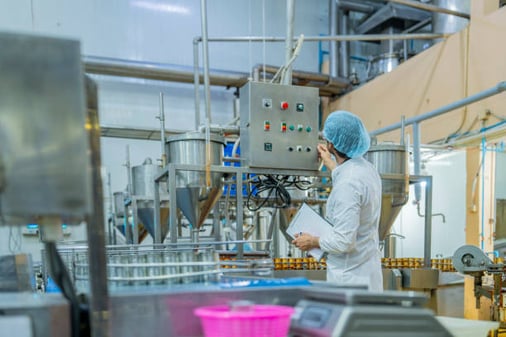
Building Supplier Resilience in Food and Beverage Manufacturing: The Role of Strategic Integration
The Food and Beverage (F&B) industry faces increasing complexity in managing supplier relationships, maintaining quality standards, and responding swiftly to supply chain disruptions. From fluctuating raw material prices and regulatory shifts to climate-related crop failures and geopolitical tensions, supply chains in this sector are more vulnerable than ever. For Purchasing Managers, the challenge lies in securing reliable suppliers while maintaining cost efficiency and agility.
To tackle this, resilient supplier management strategies supported by digital tools like PlanetTogether Advanced Planning and Scheduling (APS)—integrated with enterprise systems such as SAP, Oracle, Microsoft, Kinaxis, or Aveva—are transforming procurement into a proactive, risk-mitigating function.
This blog explores how strategic supplier management, enabled by digital integration, enhances resilience and operational stability in food and beverage manufacturing.
The Current Landscape of Supplier Risk in F&B
Food and beverage manufacturers operate under tight margins and high regulatory scrutiny. Suppliers provide critical ingredients, packaging materials, and processing aids. However, disruptions—such as the 2020 global pandemic, shipping delays through the Suez Canal, or agricultural yield variability—can lead to inventory shortages, delayed production, and compromised product quality.
Some of the top vulnerabilities faced by Purchasing Managers in F&B include:
Ingredient scarcity due to climate or trade issues
Lack of visibility into second- and third-tier suppliers
Quality inconsistencies from offshore suppliers
Inflexible procurement contracts during demand surges
Extended lead times and transportation bottlenecks
These risks make supplier resilience a top strategic priority—requiring not just cost-focused procurement but collaborative, data-driven supplier management.
Defining Supplier Resilience
Supplier resilience refers to a supplier’s ability to continue delivering goods and services consistently in the face of disruption. But it also extends to a manufacturer’s ability to anticipate supplier weaknesses, diversify supply bases, and respond dynamically to unplanned events.
Key attributes of a resilient supplier network include:
Multi-sourcing capabilities
Real-time data sharing and communication
Flexible contract terms
Transparent traceability
Joint risk planning and contingency strategies
Achieving this resilience requires a shift from reactive procurement to digitally enabled, integrated supply chain management.

How PlanetTogether APS Supports Resilient Supplier Strategies
Advanced Planning and Scheduling (APS) systems like PlanetTogether provide the analytical and predictive power needed to build supplier resilience. When integrated with enterprise platforms such as SAP, Oracle, Microsoft Dynamics, Kinaxis, or Aveva, PlanetTogether becomes a nerve center that connects supplier data, production schedules, and inventory levels.
Here’s how integration enables resilient supplier management:
Real-Time Visibility and Collaboration
Through integration with SAP or Microsoft Dynamics, Purchasing Managers gain real-time insights into supplier performance, lead times, and inventory on hand. When this data flows into PlanetTogether, planners can dynamically reschedule production in response to a delay, identify at-risk materials, or trigger alternate sourcing protocols.
For instance, if a dairy ingredient from a primary supplier is delayed, PlanetTogether can simulate production scenarios using alternate suppliers based on pricing, availability, and quality history—automatically synced from SAP.
Predictive Risk Management
With ERP-integrated APS, predictive analytics can flag supplier risks before they materialize. By using historical performance data—such as delayed shipments, inconsistent quality scores, or forecast volatility—PlanetTogether can generate risk scores. Combined with ERP data from Oracle or Kinaxis, purchasing decisions become guided by risk, not just cost.
This foresight empowers Purchasing Managers to preemptively shift orders, adjust safety stock levels, or renegotiate supply terms—all within a planning interface that aligns with company-wide production goals.
Dynamic Supplier Scheduling
A significant challenge in F&B is aligning supplier deliveries with just-in-time production. Integration between PlanetTogether and ERP systems like Aveva or SAP allows purchasing to fine-tune order placements based on production schedules, storage capacities, and material shelf lives.
This synchronization reduces waste, prevents overstocking, and ensures that high-priority production orders aren’t held up by supplier inefficiencies. Automated reordering and dynamic procurement timelines reduce manual intervention while maintaining supply continuity.
Scenario Planning and Simulation
When integrated with Oracle or Kinaxis, PlanetTogether’s simulation capabilities enable "what-if" analysis for supplier disruptions. Purchasing Managers can model the impact of a port closure, bad harvest, or regulatory import ban on production workflows and cash flow.
For example, if an imported spice becomes restricted, scenario modeling can assess alternative domestic suppliers, transportation timelines, and cost implications. These simulations equip procurement teams with evidence-based arguments for strategic sourcing changes.
Supplier Scorecard Integration
An often-underutilized tool in supplier management is the performance scorecard. By consolidating ERP data (such as on-time delivery rates, inspection rejections, or service level agreements) and feeding it into PlanetTogether, organizations can make procurement decisions rooted in comprehensive performance metrics.
This data integration promotes continuous improvement by identifying underperforming suppliers and rewarding strategic partners who align with corporate goals.
As the food and beverage industry navigates an era of uncertainty and transformation, the purchasing function must evolve from a cost-driven department to a strategic enabler of resilience. With integrated tools like PlanetTogether APS working seamlessly alongside enterprise systems such as SAP, Oracle, Microsoft, Kinaxis, or Aveva, Purchasing Managers can turn supplier risk into a competitive advantage.
By combining data-driven decision-making with proactive supplier engagement, food and beverage manufacturers can ensure product continuity, maintain customer trust, and thrive even amid global volatility.
Are you ready to take your manufacturing operations to the next level? Contact us today to learn more about how PlanetTogether can help you achieve your goals and drive success in your industry.